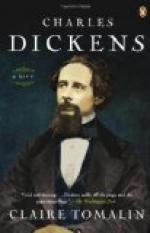Of the latter I don’t know that I need say anything. It is decidedly the weakest of his Christmas books. But “Dombey” is very different work, and the first five numbers especially, which carry the story to the death of little Paul, contain passages of humour and pathos, and of humour and pathos mingled together and shot in warp and woof, like some daintiest silken fabric, that are scarcely to be matched in the language. As I go in my mind through the motherless child’s short history—his birth, his christening, the engagement of the wet-nurse, the time when he is consigned to the loveless care of Mrs. Pipchin, his education in Dr. Blimber’s Academy under the classic Cornelia, and his death—as I follow it all in thought, now smiling at each well-remembered touch of humour, and now saddened and solemnized as the shadow of death deepens over the frail little life, I confess to something more than critical admiration for the writer as an artist. I feel towards him as towards one who has touched my heart. Of course it is the misfortune of the book, regarding it as a whole, that the chapters relating to Paul, which are only an episode, should be of such absorbing interest, and come so early. Dickens really wrote them too well. They dwarf the rest of the story. We find a difficulty in resuming the thread of it with the same zest when the child is gone. But though the remainder of the book inevitably suffers in this way, it ought not to suffer unduly. Even apart from little Paul the novel is a fine one. Pride is its subject, as selfishness is that of “Martin Chuzzlewit.” Mr. Dombey, the city merchant, has as much of the arrogance of caste and position as any blue-blooded hidalgo. He is as proud of his name as if he had inherited it from a race of princes. That he neglects and slights his daughter, and loves his son, is mainly because the latter will add a sort of completeness to the firm, and make it truly Dombey and Son, while the girl, for all commercial purposes, can be nothing but a cipher. And through his pride he is struck to the heart, and ruined. Mr. Carker, his confidential agent and manager, trades upon it for all vile ends, first to feather his own nest, and then to launch his patron into large and unsound business ventures. The second wife, whom he marries, certainly with no affection on either side, but purely because of her birth and connections, and because her great beauty will add to his social prestige—she, with ungovernable pride equal to his own, revolts against his authority, and, in order to humiliate him the more, pretends to elope with Carker, whom in turn she scorns and crushes. Broken thus in fortune and honour, Mr. Dombey yet falls not ignobly. His creditors he satisfies in full, reserving to himself nothing; and with a softened heart turns to the daughter he had slighted, and in her love finds comfort. Such is the main purport of the story, and round it, in graceful arabesques, are embroidered, after Dickens’ manner, a whole




